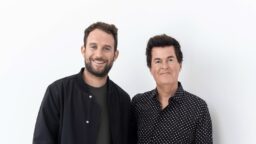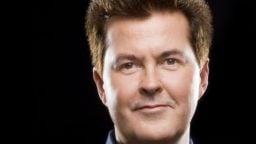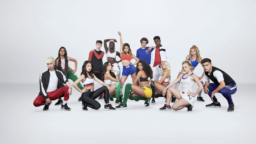Simon Fuller has revealed more details about his new music project, Now United, confirming the group’s partnership with B2B tech giant SAP – while offering some though-provoking observations about the streaming-fixated modern music business.
Now United are, according to Fuller, a “global pop group”, comprised of 14 teenagers, each from a different country.
Speaking on stage at Mobile World Congress at the Los Angeles Convention Center last Thursday (Sept 13), Fuller explained his hope that “within each country there will be a community of Now United fans that can learn the dance, sing the songs and live through the group”.
A lynchpin to this plan, he explained, would be teaming with SAP to revolutionize fan engagement.
SAP, an enterprise software corporation which turned over €23.46bn last year, is a sponsorship/tech partner of major sports franchises such as the New York Knicks, Manchester City Football Club, the New York Yankees and FC Bayern Munich, plus the NBA and NHL.
The deal with Fuller and Now United represents SAP’s first major step towards working directly within the music business (although it does have an existing partnership with Live Nation).
Fuller confirmed that, in order to recruit the 14 youngsters in Now United, he employed 20 people to travel the world for 18 months, holding auditions with groups of 10 to 20 people at a time.
“I would boldly say no one has ever done a talent search on a par with this,” he said.

In order to fulfil Fuller’s ambitions, of course, Now United (pictured inset) are going to have to break through one of the noisiest artist release schedules the world has ever known – with approximately 20,000 tracks being uploaded to Spotify daily.
It’s not a challenge Fuller is taking lightly, though the widely-respected British talent manager says he’s deliberately not pinning Now United’s hopes on the likes of Spotify and Apple Music.
“I would boldly say no one has ever done a talent search on a par with this.”
Now United’s music will be made available for free on the group’s own web platforms, in addition to YouTube.
“Everyone thinks we have to be in with the streaming services,” said Fuller, who was interviewed alongside SAP’s Chief Marketing Officer, Alicia Tillman (pictured, main).
“I challenge that. Even if it’s true, I want to learn so for myself.”
Fuller offered strong opinions on the idea that major label A&R teams are now being led by the way that consumers typically listen to music on streaming services.
“Music is going through turmoil, confusion,” he said. “We have platforms that stream music… but actually all those incredible companies are really geared up to serve their own needs. Like: let’s be sticky; let’s monetise; let’s serve our advertisers by telling them this is the demo, this is the genre, this is how long we like to listen to music for. That drives me crazy.”
Added Fuller: “Having worked with artists my whole life, I think it’s gone back to front. I mean, I can’t imagine what the Beatles would have said if a sales guy [told them]: ‘The song’s too long man,’ [or], ‘That beat is wrong.’
“I know we like to feel [this] world is all there for all – but, actually, it really isn’t. The rules are more aggressive now than they’ve ever been.”
“I can’t imagine what the Beatles would have said if a sales guy [told them]: ‘The song’s too long man,’ or, ‘That beat is wrong.'”
The SAP partnership will create new digitally-driven engagements for fans, explained Fuller, spanning music creation as well as providing input into future group members, tour locations, merchandise styles and tutorials for fans to share and interact with the band in real time.
“We believe there is a unique opportunity to use technology to foster unity among fans through a shared passion in music and dance,” said SAP’s Tillman.
“Both Now United and Simon Fuller recognize the transformative impact that technology can have in the way the group engages with its fans, and we’re excited to be a part of their future success.”
She added: “When I had the amazing opportunity to meet Simon and hear the vision I heard exactly what is at the core of SAP. While on the surface we may seem very different we are in fact very much alike.
“We have dreams to do things that have never been done before and to unite the world. For me, this would be technology and, for Simon, that would be music and dance.”
Interviewed by Variety’s Shirley Halperin, Fuller said the SAP deal was all part of a plan to achieve true engagement for Now United amongst a worldwide audience in the hundreds of thousands.
“We’re all in awe of incredible, vast platforms but I’m not sure they can get any bigger,” commented Fuller.
“There’s only one way tech will go – which is small. [There are] 7 billion people on the planet but you only need a few hundred thousand to be passionate from an artistic point of view.
“Right now, the music industry is as sterile as its ever been – and the irony is there’s never been so much great music.”
“Right now, the music industry is as sterile as its ever been – and the irony is there’s never been so much great music.”
Fuller also challenged the idea that young consumers today only wanted short-form content.
“Maybe that’s the rule for the masses but I also hear that young people binge watch TV shows for hours and hours at a time – or sit behind a [games] console for days,” he pointed out.
He added: “Everyone says the album is dead. But listening to a large piece of music isn’t dead.
“It’s only because we don’t have the opportunity to listen to the album or whatever we would [say that]… the pop songs on [streaming] playlists are short. We’re being programmed to hear short-form content.”
Fuller is something of a legendary figure in music business circles, of course. The XIX Entertainment founder has managed everyone from The Spice Girls to Annie Lennox, Amy Winehouse, Steven Tyler and Carrie Underwood during his career.
On stage, he questioned the level of engagement that modern artists are receiving on social platforms, suggesting that although he loved Instagram, “I have friends with 50 million folllowers but [their] engagement is half a percent… If that’s what engagement means in the 21st century then I’ll pass.
He added: “There’s an old phrase: ‘I’ve done it, seen it, got the T-shirt.’ Now no-one’s even got close to getting the T shirt. [It’s]: ‘I’ve glanced at it for 5 seconds and moved on.’
“That’s not because humanity has lost its soul. It’s because that’s what we’re given. I want deeper engagement.”
Fuller clearly isn’t convinced by the idea of every artist requiring a mass worldwide audience in the billions. Now United, he confirmed, remain unsigned to a traditional record company.
“I know songwriters that get a billion views or a billion streams, and I know what they’re earning,” he said. “I could generate way more more money for them with 100,000 active, passionate committed fans – so why are we getting so excited [when an artist attracts] 500 million views or streams?”
“I know songwriters that get a billion views or a billion streams… and I know what they’re earning.”
If Now United could attract this passionate worldwide fanbase, said Fuller, he’s confident that a host of commercial opportunities would open up – especially through the agreement the group had with SAP.
“I think the big answer is sponsorship – it’s a big revenue generator,” he said, noting that the sports industry had established a more lucrative relationship with sponsorship than the music business: “Yes, we sell tickets to a stadium and you license the content to be viewed but sponsorship is the No.1 revenue stream. That’s an area that music hasn’t really gone anywhere near.”
Fuller said to expect a public launch of Now United in early 2019 which will be “fairly conventional”, before praising SAP for being “at the cutting edge of technology”.
“The one thing we don’t have in music any more is time to evolve and learn,” he said. “This project is all about that.”Music Business Worldwide




